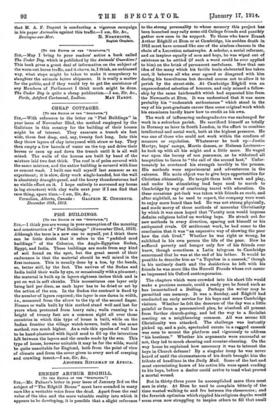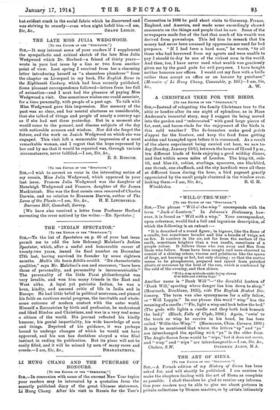ERNEST ARTHUR EDGRILL.
ITC vas Roma or ran "Brecraroa.m1
Era,—Mr. Palmer's letter in your issue of January 3rd on the subject of "The Edghill House" must have sounded in many ears like a veritable voice from the dead. Apart from the real value of the idea and the more valuable reality into which it appears to bo developing, it is possible that a slight reference to the strong personality to whose memory this project has been launched may rally some old College friends and possibly gather new ones to its support. To those who knew Ernest Arthur Edghill at Eton or at Cambridge, his sudden death in 1912 must have seemed like one of the aimless chances in the chain of a Lncretian catastrophe. A scholar, a social reformer, and an inspirer equally of men and boys, he was wiped out of existence as he settled (it such a word could be ever applied to him) on the brink of permanent usefulness. Now that ono idea of the many which his fertile brain elaborated has taken root, it behoves all who ever agreed or disagreed with him during his tumultuous but devoted course not to allow it to perish by the street-side. At Cambridge Edghill won an unprecedented selection of honours, and only missed a fellow- ship by the same hairbreadth which had separated him from the Newcastle at Eton. It was understood that it was more probably his " undonnish enthusiasms" which stood in the way of his post-graduate career than some original work which his examiners hardly knew how to credit as his own.
The work of influencing undergraduates was exchanged for work in a suburban parish. He sacrificed himself as totally in Hornsey as later in South London, in the effort to combine intellectual and social work, both at the highest pressure. He was one of those who could not work within the confines of measure or regulation. Whatsoever he took up—Justin Martyr, boys' camps, Morris dances, or Hulsean Lectures— he took up with all his might and a little more. Ho waged war upon the heresy of non possumus, as he withstood all temptation to listen to "the call of the second best." Unfor- tunately he overtaxed his strength terribly in the process. His methods were experimental and adventurous in the extreme. His main object was to give boys opportunities for Christian citizenship. He taught them both work and play, and under his stimulating lead boys used to march to Cambridge by way of combining travel with education. On these occasions pot-luck was taken with friends en route, and after nightfall, as he used to report, the company were wont to enjoy more board than bed. He was not strong physically, and made merry of those methods of muscular Christianity by which it was once hoped that 'Varsity men would impress definite religions belief on working boys. He struck out for new methods in every direction, sparing not himself or his antiquated rivals. Of settlement work, he had come to the conclusion that it was "an expensive way of showing the poor how the rich lived." Whether he was right or wrong, he exhibited in his own person the life of the poor. How he suffered poverty and hunger only few of his friends ever knew, though sometimes a Latin telegram to Cambridge announced that he was at the end of his tether. It would be possible to describe him as "a Toynhee in a cassock," though in his untimely death and the desiderium he left with his friends he was more like the Burrell Fronde whose cut career so impressed his Oxford contemporaries.
The chapters which were crowded into his short life would make a precious memoir, could a ready pen be found such as has immortalized a Dolling. Perhaps the writer may be permitted one memory. It was a Sunday, and Edghill had conducted an early service for his boys and some Cambridge visitors. Whether he felt the decorum of the day was a little painful or from a preconceived plan, he absolved all present from further church-going, and led the way to a Socialist meeting on a neighbouring common. All was serene till Christianity was attacked. The challenge was instantly picked up, and a pale, spectacled curate in a ragged cassock was seen to mount the platform and vigorously to address "hie brethren." Whether his arguments were successful or not, they led to much cheering and counter-cheering. On the way home he explained how necessary it was to interest the boys in Church defence! By a singular irony he was never beard of until the circumstances of his death brought him the tribute of headlines in the Daily Mail. Some of the last and most excruciating hours of his active life were spent reading to his boys, before a doctor could arrive to tend what proved a mortal wound.
But in thirty-three years he accomplished more than most men in sixty. At Eton he used to complain bitterly of the time wasted walking to and fro between the classrooms ; and the feverish optimism which rippled hie religious depths would seem even now struggling to inspire others to fill that small - but evident crack in the social fabric which he discovered and was striving to remedy—even when night befell him.—I am,











































 Previous page
Previous page